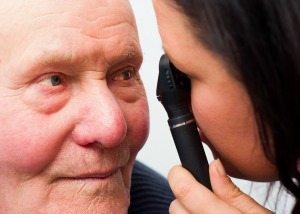Homecare Walpole MA
 Diabetic retinopathy is a complication associated with diabetes. It occurs when changes to the tiny blood vessels located in the retina change, allowing them to leak and cause distortion to vision. It is the leading cause of blindness among people with diabetes.
Diabetic retinopathy is a complication associated with diabetes. It occurs when changes to the tiny blood vessels located in the retina change, allowing them to leak and cause distortion to vision. It is the leading cause of blindness among people with diabetes.
The Good News
While this complication of diabetes is one of the most concerning, there are steps your parent can take to minimize their chances of halting the progression of this disease. The most important is taking control of their blood sugar. If medication has been prescribed, make sure they are taking it at the correct time and in the correct dose. If you are considering the services of a homecare provider, they will be able to remind your parent when it’s time for their medication.
Diet and exercise are the two other vital areas that, if controlled, can prevent or delay vision loss. Diet plays a large part in the control of blood sugar. Diets that are recommended for those with diabetes suggest limiting refined carbohydrates and packaged foods. Food in its whole state that does not provide a spike in blood sugar levels includes low-glycemic fruits and vegetables along with high-quality protein and whole-grain carbohydrates.
Foods particularly beneficial to eye health include leafy greens such as kale, spinach and collard that are high in lutein and zeaxanthin. These carotenoids are found in high concentrations in the macula—the central portion of the retina. Add greens to your parent’s diet a few days per week in addition to nutrient dense foods such as blueberries, red and orange peppers, and oranges high in antioxidants.
As far as exercise, both aerobic and strength training are recommended by the American Diabetes Association. The recommended amount of exercise is at least 150 minutes per week. Exercise programs that are particularly helpful to seniors include those that are gentle to the joints such as tai chi, yoga and water aerobics.
The most important element of exercise is that your parent enjoys it in order to ensure its continued inclusion in their schedule. If they enjoy walking, consider checking into one of the many walking groups—your senior community center is a good resource for information on group exercise programs developed specifically for the 60 and older crowd.
Help
If you find you are in need of assistance, consider obtaining the services of a homecare provider. These professionals have been caring for countless seniors who are faced with the diagnosis of diabetes and its complications. In addition to assisting with the daily activities of living, they can go grocery shopping, prepare healthy meals that are diabetic-friendly, and accompany your parent on their daily exercise routine.
Resources: http://www.diapedia.org/acute-and-chronic-complications-of-diabetes/71040851101/epidemiology-of-diabetic-retinopathy
http://www.diabetesforecast.org/2016/may-jun/research-profile.html?referrer=http://google.diabetes.org/search?site=Diabetes&client=diabetes&entqr=3&oe=ISO-8859-1&ie=ISO-8859-1&ud=1&proxystylesheet=diabetes&output=xml_no_dtd&proxyreload=1&q=recommended%20exercise
If you or an aging loved one are considering Homecare Services in Walpole MA, or anywhere in Eastern Massachusetts, please call the caring staff at CARE Resolutions – (508) 906-5572.
- Adapting Meals for Seniors with Chewing or Swallowing Difficulties - November 20, 2024
- How Playing Games Helps Alzheimer’s Patients - November 5, 2024
- What Seniors Should Know About Prescription Medicines - October 17, 2024



